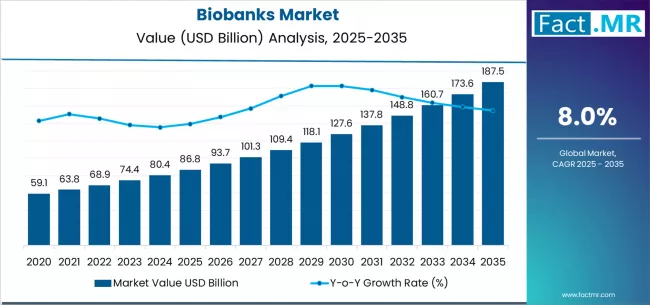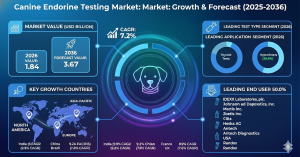Biobanks are emerging as a cornerstone of modern biomedical research, providing critical infrastructure for the collection, storage, and management of biological specimens. These repositories enable researchers to access high-quality samples, supporting drug discovery, genomics research, and precision medicine initiatives. With the growth of pharmaceutical R&D and genomics integration, biobanks have evolved from simple sample storage facilities into sophisticated platforms that drive innovation in healthcare and translational research.
Market Overview:
The biobanks market comprises physical repositories, digital biobanks, and hybrid storage solutions. Physical biobanks dominate due to their robust infrastructure for long-term preservation of biospecimens such as healthy tissue, blood, DNA, and disease-specific samples. Services within the market, including sample processing, storage, and data management, also play a critical role in facilitating research workflows. Biobanks are increasingly integrating advanced cold chain logistics and laboratory information management systems (LIMS) to ensure sample integrity, traceability, and compliance with stringent regulatory standards.
Product and Service Insights:
Services in biobanking represent a significant segment, encompassing collection, processing, quality control, storage, and distribution of biospecimens. Healthy tissue remains the most sought-after specimen type, given its wide applicability in pharmaceutical research and clinical studies. Disease-specific samples, such as cancer tissues or rare genetic material, are gaining prominence as precision medicine initiatives expand. Automated biobanking systems, including robotic sample handling and temperature-controlled storage units, enhance efficiency, reliability, and reproducibility in research operations.
Applications and End-Use:
Biobanks serve academic research institutions, hospitals, pharmaceutical companies, and government initiatives. They are vital for genomics research, epidemiological studies, drug discovery, and clinical trials. Population-based biobanks enable large-scale studies for public health and precision medicine, while disease-specific repositories facilitate targeted therapeutic development. By ensuring access to high-quality specimens, biobanks accelerate translational research and help bridge the gap between laboratory discoveries and clinical applications.
Regional Insights:
Asia Pacific is experiencing rapid growth in the biobanks market, driven by India and China, which are expanding pharmaceutical research infrastructure and genomics capabilities. North America remains a leading region due to well-established biobank programs, advanced healthcare research facilities, and robust regulatory frameworks. Europe continues to witness steady growth, supported by national biobank initiatives, population health studies, and precision medicine adoption. Emerging regions in Latin America and the Middle East & Africa are gradually expanding as biomedical research investment increases.
Market Drivers:
Several factors are fueling biobank market growth:
- Pharmaceutical and Genomics Research Expansion:Rising investment in drug discovery and genetic studies increases the need for high-quality biospecimens.
- Precision Medicine Initiatives:Tailored therapeutic strategies rely on comprehensive biobanking infrastructure for disease-specific and healthy tissue samples.
- Technological Advancements:Automated sample handling, integrated LIMS, and cold chain logistics enhance operational efficiency and sample preservation.
- Regulatory Compliance:Adherence to strict quality standards drives the adoption of premium-grade biobanking services.
- Digital Health Integration:Linking biospecimens with patient data enables advanced analytics, biomarker discovery, and longitudinal studies.
Challenges and Restraints:
The biobanks market faces challenges including high initial setup costs, complex regulatory compliance, and operational challenges in maintaining sample quality over long durations. Data privacy concerns and ethical considerations in biospecimen collection may also impact adoption, especially for population-based biobanks. Additionally, emerging markets require significant investment in infrastructure and training to meet global quality standards.
Emerging Trends:
- Automated Biobanking Systems:Robotics and automated storage enhance sample integrity and research efficiency.
- Disease-Specific Repositories:Focused biobanks enable precision medicine and targeted therapeutic development.
- Population Biobanks:Large-scale biobanks support epidemiological studies and public health research.
- Integration with Genomics Platforms:Linking biospecimens with genomics and digital health infrastructure drives advanced analytics.
- Sustainable and Scalable Biobanking:Modular and scalable designs facilitate expansion while optimizing cost-efficiency.
Competitive Landscape:
Key players in the biobanks market include Thermo Fisher Scientific, Merck KGaA, Qiagen, Hamilton Company, Tecan Trading AG, Danaher Corporation, Becton Dickinson, Charles River Laboratories, Lonza, and Stemcell Technologies. Companies compete through technological innovation, service quality, global partnerships, and expansion into emerging markets. Offering integrated solutions that combine sample management, data analytics, and compliance support is increasingly becoming a differentiator.
Future Outlook:
The biobanks market is expected to expand significantly, driven by rising adoption of precision medicine, genomics research, and advanced biobanking technologies. Services and healthy tissue samples will continue to dominate, while disease-specific biobanks and population repositories gain traction. Asia Pacific presents notable growth opportunities due to increasing biomedical research investment. Continuous innovation in automated systems, digital integration, and quality assurance will shape the market, ensuring biobanks remain essential for research, drug discovery, and healthcare advancements.
Conclusion:
Biobanks have transformed biomedical research by providing reliable, high-quality specimens essential for drug development, genomics studies, and precision medicine. Their integration with advanced technologies and digital health systems enhances research efficiency, traceability, and regulatory compliance. With global expansion, technological innovation, and rising investment in research infrastructure, biobanks are poised to remain a pivotal component of modern healthcare and scientific discovery.
Browse Full Report – https://www.factmr.com/report/biobanks-market



